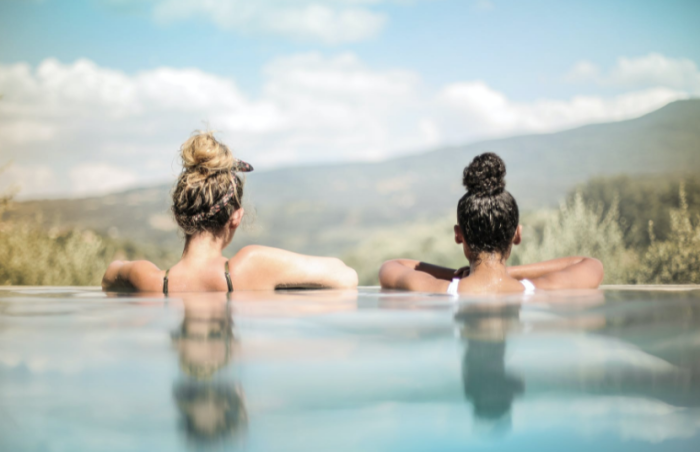I’ve only just come out as bisexual and pansexual eight months ago.
Since then, I’ve received an overwhelming amount of people asking me if I’m in love with my best friend, as is the stereotype for women to be in love with their best friends during the coming out process. Others have told me they weren’t surprised because of how close I am to my best friend.
To spill the tea, I am very much in love with my best friend. But not in the romantic way you might have expected, and not in the traditional platonic way either. Quite frankly, the whole situation has had my mind tied in knots recently. What I have with my best friend feels simple and easy, yet for some reason always seems a bit complicated to explain.
I think there is actually a clear explanation for what we have, but the explanation has felt complex because it necessitates breaking down how we as a society view both romantic and platonic partnerships.
To be specific, I am in what is considered a queer platonic life partnership with my best friend. Essentially, QPLP is a term that refers to greater levels of commitment and deeper feelings of emotional closeness than that of traditional friendships. However, it generally does not include romantic or sexual feelings by those involved. Queer platonic life partners usually have their own separate dating lives outside of their relationship together.
I think the most important thing to note here is that a QPLP is defined however the individuals in the relationship choose to define it. Labels are tricky because we can’t simply lump everyone into easily definable categories. But labels can also be useful tools for beginning to put language to feelings, situations, and practices that we don’t traditionally recognize in society.
As for my QPLP and I, our partnership does not include romantic or sexual feelings for each other. We also never refer to ourselves as “queer platonic life partners.” But we have often discussed how the term describes our relationship perfectly, despite our preference to use other labels. We usually just call each other best friends, although we have an understanding between us that “best friends” is not able to encapsulate the feelings we have for each other and our level of commitment to one another. Our relationship is distinctly filled with more emotional connectedness, trust, love, and commitment than a traditional friendship.
We’ve sort of given up explaining our relationship to other people, unless it comes up in a longer conversation, because it involves a level of discussion we may not always have the time for—which is why I think writing this article is especially important.
Traditionally, we understand that friendships express themselves in a variety of ways. It is the nature of all human relationships to have varying levels of emotional connectedness, intimacy, trust, and comfortability. Because we often find it is easiest to express certain versions of ourselves around others, having that variety is important. These varying relationships enable a well-rounded sense of self-expression in our human interactions.
But there are some people you come across with whom you don’t have to express only certain aspects of yourself. You can be a completely raw and unfiltered version of yourself. You’re able to express the entirety of who you are around these people with a sense of intimacy and closeness that goes deeper than any other human partnership, be it platonic or romantic.
This is how I would define a soulmate.
Taking this definition into account, it’s important to note that there does not exist only one soulmate per person. You can absolutely have this connection with multiple people throughout your life, with and without romantic feelings, and at the same or separate times. And you can have this connection in both romantic and platonic relationships simultaneously.
This is not to minimize the importance of our varying friendships. Just because we may be able to express ourselves in our entirety with one person doesn’t mean we should stop socializing with or appreciating the other people and relationships in our life. Humans are social creatures, and we are meant to have different types of relationships; they are all equally important in supporting our human needs.
In these months since coming out and navigating the romantic single person’s life after a two-year relationship, my QPLP has helped me come to many realizations about the way I view and want to participate in romantic and platonic relationships moving forward.
I think it is often easy for us to jump into committed romantic relationships with someone who we have less emotional intimacy with compared to other friendships in our lives. And it’s because we’ve been raised to expect a romantic partner to be someone who we feel romantically and sexually attracted to, emotionally and intellectually close to, and someone with whom we can also share non-physical intimacy. The traditional romantic partner is supposed to satisfy all the needs we could ever possibly seek from a human relationship.
Something my QPLP and I have both noticed in our dating lives is that our romantic partners often seem to feel threatened by the closeness of our relationship. This really sheds light on the societal norm that romantic relationships are supposed to be regarded as the “gold standard” of relationships, even more so than close friendships. And I have some beef to pick with this idea.
How can we possibly expect one person to satisfy all of these needs? Of course many happy couples feel like they’ve achieved this, which is great. But I’ve realized that this is a difficult type of relationship to find with anyone.
Which brings me to another—dare I say more important—question: Why on earth do we value romantic relationships above platonic relationships? Especially when I feel like I can never express myself as well with romantic partners as much as I can in my QPLP.
Why is it normal to assume we should automatically be emotionally intimate with romantic partners, who we have usually known for less time than our friends? I have been with my QPLP for five years now, and I simply cannot expect to be emotionally connected with any future romantic partner the way I am with her, especially after just a few weeks or months. It feels backwards for me to put a romantic relationship on a pedestal when my QPLP has been growing and flourishing for far longer.
Another question: Why can’t introducing my platonic partner to my family be as big of a deal as introducing a romantic partner?
I remember feeling frustrated when I introduced my QPLP to my family for the first time. I knew it wouldn’t be considered as grand of an event as bringing home a romantic partner. Fortunately, after meeting my QPLP, it was easy for them to see the type of relationship we had. She immediately became regarded as part of the family—as more than just a “best friend.”
And one more question: Why is it normal to move in with a romantic partner, or move across the country for a romantic partner, as opposed to doing so with a platonic partner?
My QPLP and I are currently living on opposite sides of the world due to extenuating life circumstances on both of our ends. But if it weren’t for our current situations, it wouldn’t even be a question as to whether we would live together. We already did for four years and have an intimate comfortability in our living situation.
My QPLP is a central part of my life, and always will be. I think it’s important to be able to express my feelings for her openly and begin discussions around these types of relationships, especially since we are so openly affectionate. Furthermore, I am sure many of you will find that you may be in or have similar types of relationships with people in your lives that perhaps you never viewed in this way.
This Valentine’s Day, and every day before and after, I will celebrate the fact that I’ve met someone who I’ve completely fallen in love with, independent of sexual and romantic feelings. I’m celebrating the human capability to have many types of relationships on this spectrum of emotional closeness, be it platonic love, romantic love, sexual love, and any and everything in between.
I wish you all a beautiful day—a beautiful life—of celebrating the many forms of love you have in your world today.
~


 Share on bsky
Share on bsky





Read 4 comments and reply